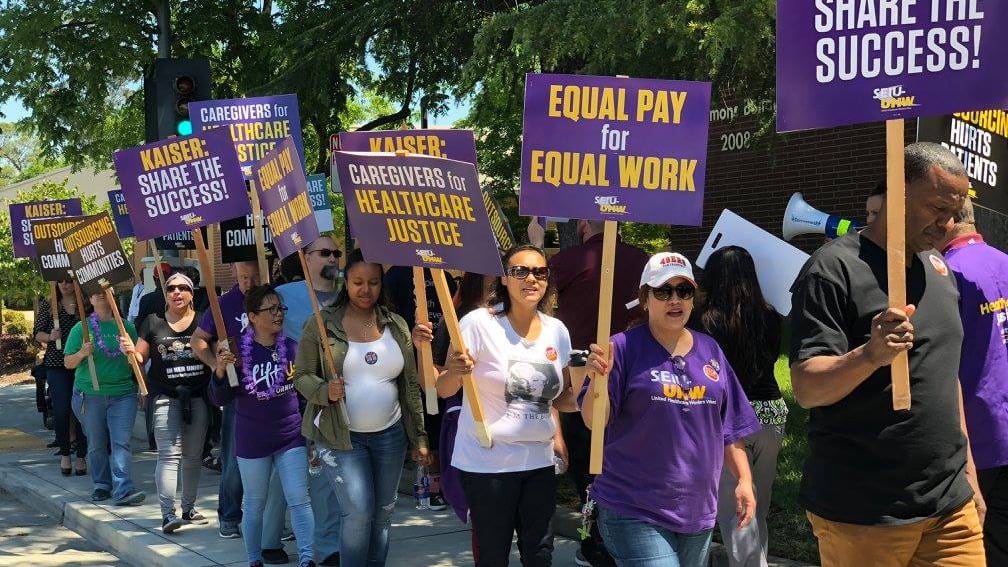Oregon and some Washington Kaiser Permanente workers will begin voting tomorrow on whether to strike over the healthcare company's alleged unfair labor practices, according to the Coalition of Kaiser Permanente Unions.
The coalition said that Kaiser has bargained on labor practices "in bad faith," adding that the healthcare company's record profits and excessive compensation to its executives contradict its nonprofit status and ethos.
"Kaiser Permanente has absolutely lost its way," Jen Forrester, a Kaiser medical assistant, said in a statement. "Even though they boast about helping patients and employees thrive, the reality is, while we're doing our best to build up our communities and give patients the best care, Kaiser continues to undercut our work by raising prices for patients, undermining quality healthcare, not bargaining in good faith, and attacking the healthcare workers who are the backbone of its success."
If approved, the planned five-day strike of more than 80,000 workers would begin in early October, after the coalition's current contract expires Sept. 30.
In a statement, Kaiser Permanente called the decision to vote on a strike "counterproductive," writing that it is "simply a bullying tactic designed to pressure us during the contract bargaining process."
The statement adds that, though the coalition's proposed contract would increase wages an average of 32 percent above the market over the next five years, it would also add one billion dollars to Kaiser's labor costs.
"At a time when we are working hard to keep our care affordable, the Coalition's demands are not fair to our members and the communities we serve," wrote Arlene Peasnall, the senior vice president of human resources at Kaiser Permanente.
Kaiser and its unions have a rocky history.
In September 2011, Kaiser and other healthcare workers in California held a strike of 29,000 workers to protest proposed budget cuts, according to data from the Bureau of Labor Statistics (BLS). Two smaller strikes of one or two thousand workers in California had also taken place earlier that year.
And only a few months later in January 2012, California's Kaiser workers and other healthcare employees held a one-day strike over a dispute over a new contract for mental health and optical employees, according to CBS San Francisco. About 21,000 workers from Kaiser, the California Nurses Association and the National Union of Healthcare Workers, among others, participated, according to BLS data. In March 2016 and December 2018, strikes of about a few thousand Kaiser workers and others also took place.
Kaiser workers in California began voting on July 29, a process that will likely continue into early September as workers in Colorado, Maryland, Virginia and Washington, D.C., also begin voting.
The union coalition represents 4,500 Kaiser workers in Oregon and Washington, spokesperson Alisha Qiu said, not including doctors, some nurses and medical technicians. This number does count workers in other areas, such as janitors and cafeteria workers.
Nationally, the union coalition represents more than 80,000 Kaiser workers from a handful of unions, including local chapters of the Service Employees International Union and the Office and Professional Employees International Union.
Employees of Kaiser Northwest—which covers the areas in Portland, Eugene and Vancouver, Washington—will vote whether to strike. But at Kaiser Washington, which covers Northwest, Central and Eastern Washington, workers will not be voting, as their union contract expires Oct. 31.
Oregon and some Washington Kaiser workers will vote at the Central Interstate Medical Center on Wednesday, Aug. 7, from 11 a.m. to 2 p.m.
Clarification: A previous version of this story wrote that Oregon and Washington Kaiser workers would be voting. Kaiser Northwest employees in Washington, those in Cowlitz and Clark counties, will be voting. Kaiser Washington employees will not be voting to strike. WW regrets the error.
